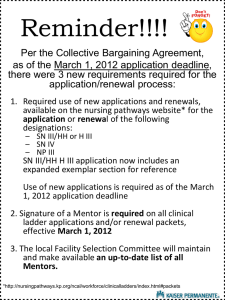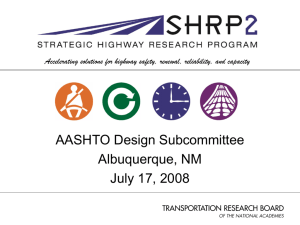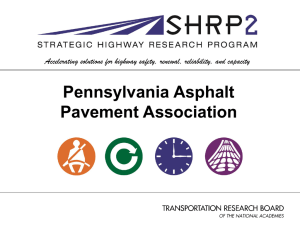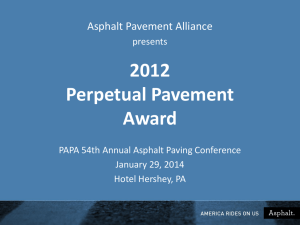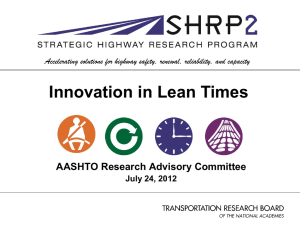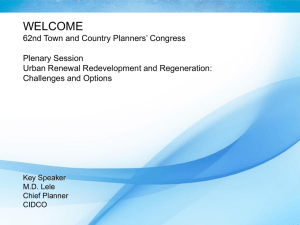SHRP 2 Renewal The Life Cycle Appraoch
advertisement
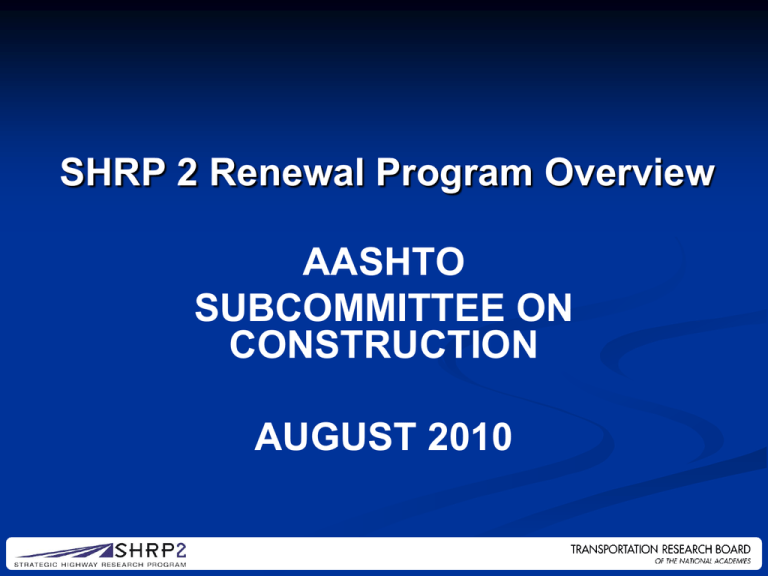
SHRP 2 Renewal Program Overview AASHTO SUBCOMMITTEE ON CONSTRUCTION AUGUST 2010 What Questions will be addressed? What is Highway Renewal? Why is it important? What is the SHRP 2 Renewal Program? How can I use the SHRP 2 Products? What are we facing Heavy Traffic Volumes Concern to maximize the movement of traffic Restrictions on the time and length of traffic lane closures Need to maximize service life of facilities Need to minimize impacts to the community What is Highway Renewal? The reconstruction or substantial rehabilitation of deteriorating highway infrastructure to new standards of service, while the infrastructure continues to serve the traveling public. Rapid Renewal implies accelerated construction but also includes project delivery, design, and operational & maintenance features that minimize the total project length and produces long lasting facilities 28 Research Projects - $32 Million Rapid Approaches Minimize Disruption R01. Locating Utilities* R11. Strategic Approaches at Corridor/Network Level R02. Geotech Solutions R03. Worker Fatigue R04. Innovative Bridge Designs R05. Modular Pavement R06. High-Speed NDT* Long-Lived Facilities R19. Bridges for Service Life of 100 Years* R16. Railroad-DOT Mitigation Strategies R15. Integrating Utility and Transportation Agency Priorities* R21. Composite Systems R23. Using Existing In-place Pavement & Achieving long Life R26. Preservation Approaches R07. Performance Specs R09. Risk Manual R10. Project Management for Large Projects * Technology Related Project Delivery Related Indicates Multiple Projects R03. Identifying and Reducing Worker, Inspector, and Manager Fatigue in Rapid Renewal Environments 2009 2010 Phase 1 2011 2012 Phase 2 Anticipated Outcomes • Techniques to reduce worker fatigue • Strategies to incorporate fatigue reducing practices into rapid renewal projects • Strategies to educate the transportation community and leaders on the importance of mitigating fatigue. Prime contractor: Project Completion: Battelle Institute March 31, 2012 R07. Performance Specifications for Rapid Highway Renewal 2007 2008 Phase 1 2009 Phase 2 2010 Phase 3 2011 2012 Phase 4 Anticipated Outcomes – Guidelines for ranking performance parameters (e.g., time, quality, cost, risk, complexity) based on project type – Specifications for different highway renewal scenarios and guidelines for their implementation – Electronic version of Specifications available for use by practitioners Prime contractor: Project Completion: Trauner Consulting Services, Inc February 2012 R09. Guide for the Process of Managing Risk on Rapid Renewal Contracts 2007 2008 2009 2010 2011 2012 Phase 1 Anticipated Outcomes • Guide for conducting risk management on rapid renewal contracts • Materials to aid SHAs with the implementation of the Guide, including two test workshops Prime contractor: Project Completion: Golder Associates Inc Fall 2010 Project R09 2007 2008 2009 2010 2011 2012 Phase 1 R09. Guide for the Process of Managing Risk on Rapid Renewal Contracts Completed Assessment of Guide to Risk Assessment and Allocation for Highway Construction Management for applicability to Rapid Renewal Contracts. Development of components of the risk report that need to be further developed for Rapid Renewal application. Guide, Training Materials and Workshops Workshop with NCDOT in October 2009 2nd Workshop May 2010 in Redmond Washington R10. Project Management Strategies for Complex Projects 2009 2010 Phase 1 2011 Phase 2 2012 Phase 3 Anticipated Outcomes Tools that transportation agencies can be use to develop innovative and effective project management strategies to accelerate sound decision-making during rapid renewal projects. • A guidebook for innovative project management • Example Case studies of project management strategies for complex projects • Workshop and training packages to support adoption of these management strategies by all stakeholders Prime contractor: Project Completion: Iowa State University February 2012 Current Project Management Model Quality Cost Schedule Traditional “Iron Triangle” of Project Management Proposed Project Management Framework Quality (Technical) Context Cost Schedule Financing SHRP 2 Products – How do they fit R06D SHRP2 Renewal Solutions R02 R05 R06C R06B R06E R07 R21 R23 R06D R26 SHRP 2 Renewal The Life Cycle Approach Construction Procurement Design Operations & Maint Planning SHRP 2 Renewal The Life Cycle Approach Planning DOT/Railroad Successful Practices and Model Agreements DOT/Utility Successful Practices Guidelines and tools for: • Project Management • Risk Management • Corridor and Network Level planning for Renewal Projects Design DOT Utility Successful Practices Tools and Guidelines for Utility Location and Relocation NDT tools for gathering data for input into Design Design Guidelines and tools for: •Long Life Pavements •Geotechnical Solutions •Long life Bridges SHRP 2 Renewal The Life Cycle Approach Procurement DOT Railroad Model Agreements DOT Utility Best Practices Guidelines and tools for: • Performance Specifications • Project Management • Risk Management and Transfer • Worker and Manager Fatigue Management Construction Construction Guidelines and tools for: • Long Life Pavements Modular Pavements Composite Pavements Using Existing Pavement in place • Geotechnical Solutions • Long life Bridges • Worker Fatigue NDT tools for Construction QA/QC SHRP 2 Renewal The Life Cycle Approach Operations & Maint. NDT tools to assess the ongoing condition of roadways, bridges, and Tunnels Guidelines and tools for: • Preservation approaches for High Traffic Volume Roadways • Maintenance and preservation of 100 year bridges Construction Quality Assurance Tools Construction Operations & Maint. Nondestructive Testing Tools Evaluation of Field Spectroscopy Devices Infrared and GPR for Uniformity Measurement of New HMA Layers Real-Time Smoothness Measurements of PCC Pavements What SHRP 2 is doing … Condition Assessment Operations & Maint. Planning Nondestructive Testing Tools NDT to Identity Bridge Deck Deterioration NDT to Identify Delaminations between HMA Layers NDT for Tunnel Linings Design Long Life Pavements Focusing on tools for the design, construction, and preservation of long life pavements. Planning Design Design guidelines Proc. Construction Operations and Maint. Construction guidelines • New composite pavement systems • Using the existing pavement structure in place for use during new pavement construction • Modular Pavement Systems • Soil Stabilization • Guidelines for assesses real-time PCC Pavement Smoothness During Construction Guidelines for pavement presentation on High Traffic Volume Roadways NDT tools for condition assessment Long Life Bridges Service Limit State Design Focus on developing new design codes that incorporate a rational approach based on SLS for durability and performance of bridges performance measures that utilize full probability-based service life design criteria Planning Design Proc. Construction • Recommendations for LRFD Design and LOAD RATING Specs • SLS approach, method for re-calibration, toolbox database, examples •Implementation plan Operations and Maint. Long Life Bridges Innovative systems Focus on Improving existing and prove promising concepts for systems, subsystems, and components that historically limit the service life of bridges • Recommendations for LRFD Design Specs • Analysis methods • Details Planning Design Recommendations for LRFD CONSTRUCTION Specs Proc. Const. Operations & Maint Stand-alone guide devoted to Design for Life. Thank you for listening www.trb.org/shrp2 James Bryant jbryant@nas.edu
